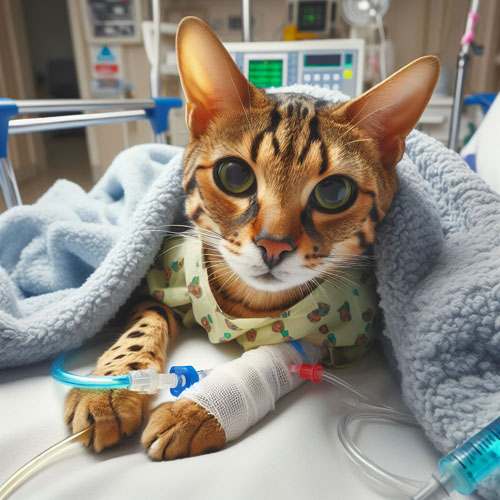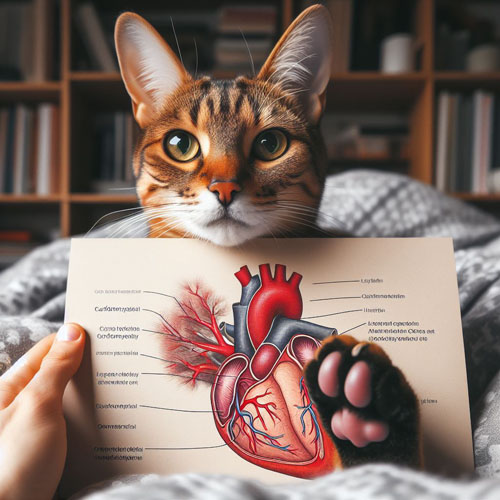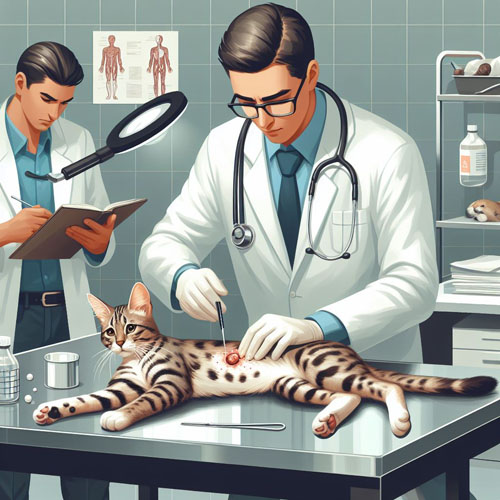Understanding Pyruvate Kinase Deficiency (PKD)
Understanding Pyruvate Kinase Deficiency (PKD) in Cats: Causes, Symptoms, and Prevention
Pyruvate Kinase Deficiency (PKD) is a genetic disorder in cats characterized by a deficiency of the enzyme pyruvate kinase (PK). This condition can have severe implications for a cat’s health, leading to anemia and other blood-related complications. In this article, we will delve into the causes, symptoms, and prevention of PKD in feline companions, shedding light on the importance of genetic testing to identify and manage this condition effectively.
Understanding Pyruvate Kinase and Its Role: Pyruvate kinase is a crucial enzyme involved in the glycolytic pathway, which is responsible for converting glucose into energy within cells. In the context of red blood cells, pyruvate kinase plays a vital role in maintaining their structural integrity and preventing premature breakdown. Red blood cells lacking sufficient pyruvate kinase are more prone to hemolysis, a process where they break down faster than normal, leading to a shortage of healthy red blood cells.
Causes of Pyruvate Kinase Deficiency in Cats: PKD in cats is primarily a genetic condition, meaning it is inherited from one or both parents. The specific mode of inheritance is autosomal recessive, requiring both parents to carry and pass on the faulty gene for the condition to manifest in their offspring. Cats with one copy of the faulty gene are carriers but do not exhibit symptoms. When two carriers mate, there is a one in four chance of their offspring inheriting two copies of the defective gene, resulting in PKD.
Symptoms of Pyruvate Kinase Deficiency: Identifying PKD in cats can be challenging, as symptoms may not manifest until the cat is several months old. Common signs of PKD include:
- Anemia: The most prevalent symptom is anemia, characterized by pale gums, lethargy, and weakness. Anemic cats may also display rapid breathing and an increased heart rate.
- Jaundice: Cats with PKD may develop jaundice due to the breakdown of red blood cells, leading to the accumulation of bilirubin. Yellowing of the gums, eyes, and skin is indicative of jaundice.
- Enlarged Spleen: The spleen, responsible for filtering and removing damaged red blood cells, may become enlarged as it works overtime to manage the increased breakdown of cells.
- Weight Loss: Cats affected by PKD may experience weight loss despite a normal or increased appetite.
- Lethargy and Weakness: A decline in energy levels and overall weakness may be observed in cats with PKD.
Preventing Pyruvate Kinase Deficiency in Kittens: While there is no cure for PKD, preventative measures can be taken through genetic testing and responsible breeding practices. Breeders can identify carriers of the faulty gene through DNA testing and make informed breeding decisions to avoid mating two carriers. By ensuring that only cats without the defective gene reproduce, the likelihood of producing offspring with PKD is significantly reduced.
Genetic Testing – A Vital Tool: Genetic testing is a powerful tool in preventing PKD in kittens. It involves screening cats for the presence of the faulty gene associated with PKD. Responsible breeders routinely conduct genetic tests on their breeding cats to identify carriers and make informed decisions about pairings. Testing allows breeders to avoid mating two carriers, minimizing the risk of producing offspring with PKD.
The Importance of Breeder Responsibility: Breeders play a crucial role in preventing and managing genetic disorders like PKD. Responsible breeding practices involve thorough health screenings, genetic testing, and transparent communication with potential cat owners. Breeders committed to the well-being of their feline companions prioritize the health of their breeding cats and work towards eliminating genetic disorders within the breed.
Early Detection and Veterinary Care: If a cat is suspected of having PKD, prompt veterinary attention is crucial. Diagnosis typically involves a combination of blood tests, physical examinations, and, in some cases, genetic testing to confirm the presence of the defective gene. Early detection allows for timely intervention and management to improve the cat’s quality of life.
Management and Supportive Care: While there is no cure for PKD, supportive care can help manage the symptoms and improve the overall well-being of affected cats. Treatment may include blood transfusions to address anemia, medications to support the spleen, and nutritional supplements to support overall health. Regular veterinary check-ups are essential for monitoring the cat’s condition and adjusting the treatment plan as needed.
Conclusion:
Pyruvate Kinase Deficiency is a serious genetic condition that can impact the health and well-being of cats. Through genetic testing and responsible breeding practices, breeders can play a pivotal role in preventing PKD in kittens. Early detection and veterinary care are essential for managing the condition and providing affected cats with the best possible quality of life. As we continue to advance our understanding of feline genetics, the collaboration between breeders, veterinarians, and cat owners becomes increasingly important in ensuring the health and longevity of our feline companions.





